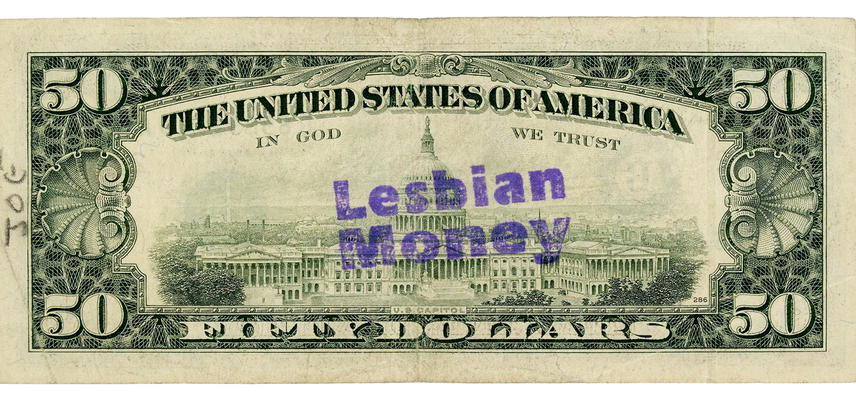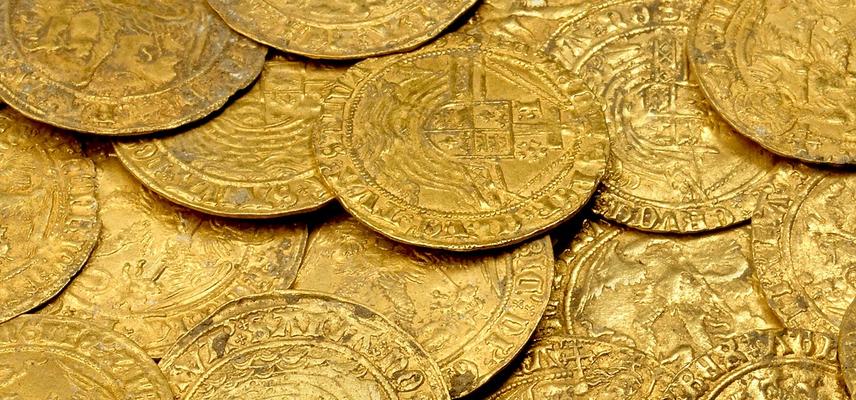BULLDOG BATHS LGBTQ HISTORY STORY
Read about the 'Bulldog Baths' tokens distributed to the participants at Gay Freedom Day, 1980 and 1981 in San Francisco.
4-minute read
By Shailendra Bhandare
Curator of South Asian and Far-Eastern Coins and Paper Money
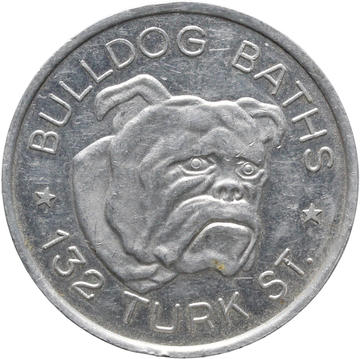
Pride parades are a major feature of LGBTQ+ celebrations across the world and they began as politically motivated protest marches demanding action on a host of issues like social and religious prejudice, civil rights, homophobia and discrimination. San Francisco, with its Bohemian cultural fabric, emerged as an early epicentre of the gay movement in the USA.
On 27 June 1970, 20 to 30 people took part in a Gay Liberation March, followed by a gathering at the Golden Gate Park the following day, which was promptly raided and dispersed by the police who took seven people into custody. Notwithstanding, in the decade of the 70s the movement gathered pace – the celebration of the June 1970 events gradually grew into the San Francisco Gay Pride.
The parade has been held every year since 1972 (only interrupted by the COVID pandemic), taking place during the last weekend of June to honour the anniversary of the Stonewall Riots. Each year has a particular theme, which is reflected in publicity material, merchandise and memorabilia related to the event.
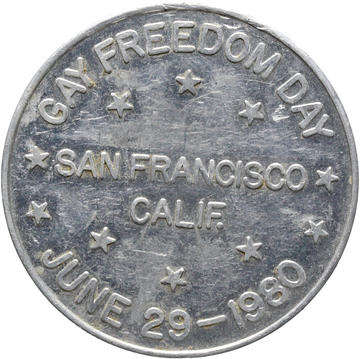
Two interesting pieces related to the San Francisco Gay Pride were gifted to the Heberden Coin Room in 2010 by Stephen Album (HCR115359 and HCR115360).
These are tokens or medallets that were presumably distributed to the participants at the pride parade events 1980 and 1981 – they are both made of aluminium but one is clad with a copper-like finish. On the reverse, they both have a text marking 'Gay Freedom Day’ and on the obverse, we see the advertisement for ‘Bulldog Baths’, located at 132 Turk Street. This very likely suggests that they were a part of the pride memorabilia repertoire, sponsored by a gay bathhouse or ‘sauna’ of that name.
Public bathhouses, by their very nature, have historically offered opportunities of privacy and intimacy to their clientele. Their commercial nature meant that choice and consent were at the core of their trade. In the 19th and 20th century, bathhouses emerged as spaces used by gay, bisexual and queer men in search of avenues for intimacy ‘behind closed doors’ that were rare and dangerous, given the highly discriminatory and prejudicial attitudes prevalent in society towards homosexuality.
Bathhouses with such a reputation came to be seen as dens of iniquity and became frequent targets of police raids, leading to criminal indictments against anyone found on the premises. However, in the days of the gay liberation movement, much like other commercial institutions, the bathhouses also emerged as centres of galvanising, disseminating and co-ordinating opinions and actions. They have since become an integral part of the gay scene the world over.
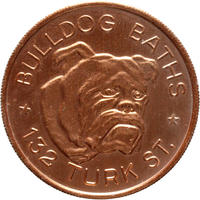
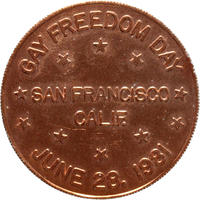
Bulldog Baths opened in 1978 and soon emerged as the largest gay bathhouse in the USA. Available evidence suggests it marketed itself using a highly suggestive array of posters, advertisements and other paraphernalia such as discounted entry coupons. It touched upon the hyper-masculine side with a BDSM flavour and was well known for its prison-like décor.
An advertisement for Bulldog Baths appears in the official souvenir circulated for the 1980 pride event, showing that the business was closely associated with organisation of the San Francisco Gay Freedom Day celebrations.
Bulldog Baths were forced to shut down in 1984 amidst a crackdown on gay bathhouses as part of a backlash of the AIDS pandemic. In 2012, the premises where the Bulldog Baths functioned were recognized in the National Register of Historic Places and awarded a commemorative plaque. In 2014, a dog-grooming café opened its doors on 130-132 Turk Street with the same name! As the COVID pandemic began to subside in spring 2022, it was anticipated that a branch of ‘Eros’, a sex club chain would open here in time for the Pride in summer
The Bulldog Baths tokens stand testimony to an energetic, turbulent and assertive time in the gay movement. Events like Gay Freedom Day were instrumental in dismantling the prejudice faced by the LGBTQ+ community and re-instilling pride. It is remarkable that seemingly small and insignificant objects like these tokens help us revisit that important past.
February marks LGBTQ+ History Month, follow the link below to explore more LGBTQ+ connections and pride stories in our collection.



